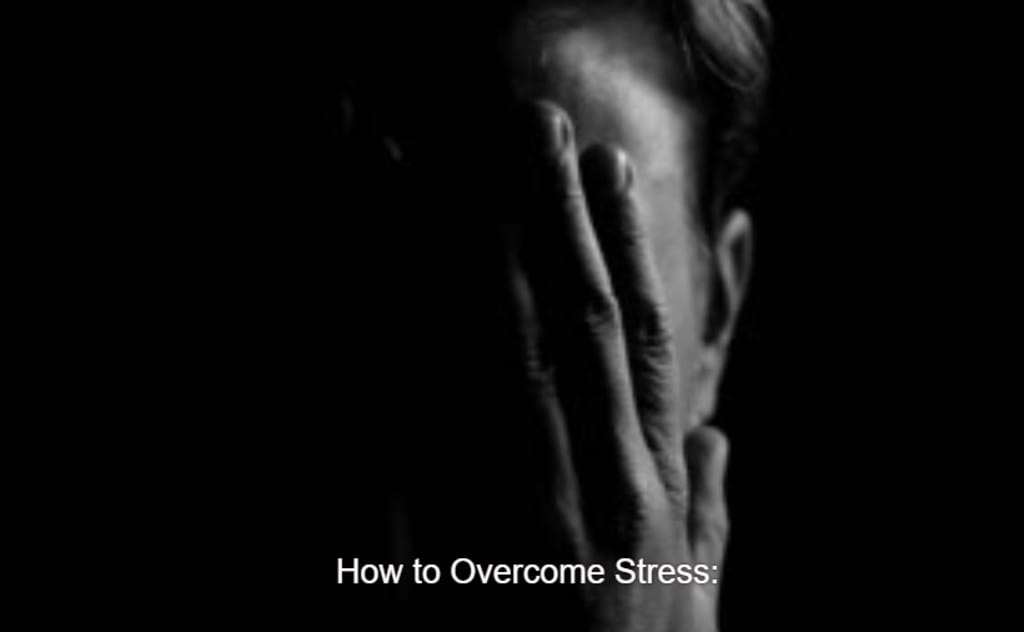
Stress is a common part of life, and it can be caused by a wide range of factors, from work-related pressure to personal problems or health concerns. While some stress can be beneficial in motivating and energizing us, chronic stress can have serious negative effects on our health and well-being. Fortunately, there are many effective strategies for managing stress and reducing anxiety. In this article, we will explore some of the best ways to overcome stress and improve your overall well-being.
Understanding Stress and its Effects on the Body:
Before we dive into strategies for managing stress, it's important to understand what stress is and how it affects our bodies. Stress is the body's natural response to a perceived threat, and it triggers a series of physical and emotional responses that can prepare us to fight or flee. These responses include the release of adrenaline and cortisol, increased heart rate and blood pressure, and heightened awareness and alertness. While these responses can be helpful in short-term situations, chronic stress can take a toll on the body, leading to fatigue, anxiety, depression, and a range of physical health problems.
The Effects of Stress on the Body
When the body experiences stress, it triggers the release of hormones, such as cortisol and adrenaline, which help prepare the body for a fight or flight response. This response can have a number of effects on the body, including:
1. Increased Heart Rate and Blood Pressure: When the body is under stress, the heart beats faster and harder, causing blood pressure to rise. This can increase the risk of heart disease and stroke if experienced over a long period of time.
2. Digestive Problems: Stress can also affect the digestive system, causing symptoms such as nausea, diarrhea, and constipation. It can also exacerbate conditions such as irritable bowel syndrome.
3. Decreased Immune Function: Chronic stress can weaken the immune system, making the body more susceptible to infections and diseases.
4. Muscle Tension: When the body is under stress, the muscles tense up, which can lead to headaches, back pain, and other musculoskeletal problems.
5. Sleep Problems: Stress can interfere with sleep, making it harder to fall asleep, stay asleep, or achieve restful sleep. This can lead to fatigue, irritability, and other problems.
Strategies for Managing Stress:
One of the most effective ways to manage stress is to identify the sources of stress in your life and find ways to reduce or eliminate them. This may involve setting boundaries at work or in personal relationships, prioritizing self-care and relaxation time, and practicing stress-reducing techniques such as meditation or deep breathing exercises. Other effective strategies for managing stress include getting regular exercise, eating a healthy diet, and practicing good sleep hygiene.
In today's fast-paced world, stress is a common experience for many people. Whether it's related to work, family, or personal issues, stress can have a negative impact on our physical and mental health. Fortunately, there are many strategies that can be used to effectively manage stress. In this article, we will explore some of the most effective stress management strategies.
1. Exercise
Exercise is one of the most effective stress management strategies. Physical activity has been shown to reduce stress, improve mood, and increase energy levels. Exercise can be as simple as taking a walk or engaging in a more intense workout routine. The key is to find an activity that you enjoy and can incorporate into your daily routine.
2. Relaxation Techniques
Relaxation techniques, such as deep breathing, meditation, and yoga, can be very effective in reducing stress levels. These techniques help to calm the mind and body and promote a sense of relaxation. They can be done at home or in a group setting, and can be easily incorporated into your daily routine.
3. Time Management
Effective time management can help to reduce stress levels by providing structure and organization to your day. Prioritizing tasks, setting realistic goals, and taking breaks can help to reduce the feeling of being overwhelmed. Planning ahead and breaking tasks into smaller, more manageable chunks can also be helpful.
4. Social Support
Having a strong support network can help to reduce stress levels. Spending time with friends and family, and seeking out support from others, can help to reduce feelings of isolation and stress. Joining a support group or attending counseling can also be helpful for managing stress.
5. Self-Care
Taking care of oneself is an important part of managing stress. Eating a healthy diet, getting enough sleep, and engaging in activities that bring joy can help to reduce stress levels and improve overall health. It's important to take time for oneself and to prioritize self-care activities.
6. Mindfulness
Mindfulness is the practice of being present in the moment, without judgment or distraction. Mindfulness techniques can be very effective in reducing stress levels and promoting relaxation. Techniques such as mindful breathing, body scanning, and guided imagery can be used to help manage stress.
7. Avoiding Unhealthy Coping Mechanisms
Many people turn to unhealthy coping mechanisms, such as overeating, smoking, or drinking alcohol, to manage stress. While these behaviors may provide temporary relief, they can actually increase stress levels in the long run. It's important to find healthy ways to manage stress and to avoid using unhealthy coping mechanisms.
When to Seek Professional Help for Stress:
While many people can manage stress on their own with lifestyle changes and stress-reducing techniques, it's important to seek professional help if stress is interfering with your daily life or causing physical or emotional health problems. This may involve talking to your healthcare provider or a mental health professional such as a therapist or counselor. These professionals can help you identify the sources of stress in your life, develop coping strategies, and provide support and guidance as you work to overcome stress and improve your overall well-being.
Stress is a normal part of life, and everyone experiences it from time to time. However, when stress becomes overwhelming and interferes with your daily life, it may be time to seek professional help. Here are some signs that you should consider seeking professional help for stress.
1. Your Stress is Persistent
If you feel stressed out most of the time, or if your stress has been going on for several weeks or months, it may be time to seek professional help. Persistent stress can lead to physical and mental health problems, and it can also interfere with your work, relationships, and daily life.
2. Your Stress is Affecting your Physical Health
Stress can have a negative impact on your physical health. If you are experiencing physical symptoms, such as headaches, stomach problems, or chest pain, it may be a sign that your stress levels are too high. In some cases, stress can also lead to more serious health problems, such as high blood pressure, heart disease, or diabetes.
3. Your Stress is Affecting your Mental Health
Stress can also have a negative impact on your mental health. If you are experiencing symptoms of anxiety, depression, or other mental health issues, it may be a sign that your stress levels are too high. If your stress is interfering with your ability to function on a daily basis, it may be time to seek professional help.
4. Your Coping Mechanisms aren't Working
If you are using healthy coping mechanisms, such as exercise, relaxation techniques, and social support, but you still feel overwhelmed by stress, it may be a sign that you need professional help. A mental health professional can help you identify more effective coping strategies and provide you with the support and guidance you need to manage your stress.
5. Your Stress is Related to a Traumatic Event
If you have experienced a traumatic event, such as a natural disaster, accident, or violence, you may be experiencing high levels of stress. Trauma can have a lasting impact on your mental health, and it may be necessary to seek professional help to process your feelings and emotions.
In conclusion, stress is a common part of life, but chronic stress can have serious negative effects on our health and well-being. By understanding the sources of stress in your life, making positive lifestyle changes, and practicing stress-reducing techniques such as mindfulness and relaxation exercises, you can overcome stress and improve your overall quality of life. If stress is interfering with your daily life or causing physical or emotional health problems, don't hesitate to seek professional help.
About the Creator
Shino
Shino is a talented writer with a passion for crafting compelling and thought-provoking stories. With a keen eye for detail and a love of language, Shino has gained a reputation as one of the talented and respected writers in their field.






Comments
There are no comments for this story
Be the first to respond and start the conversation.